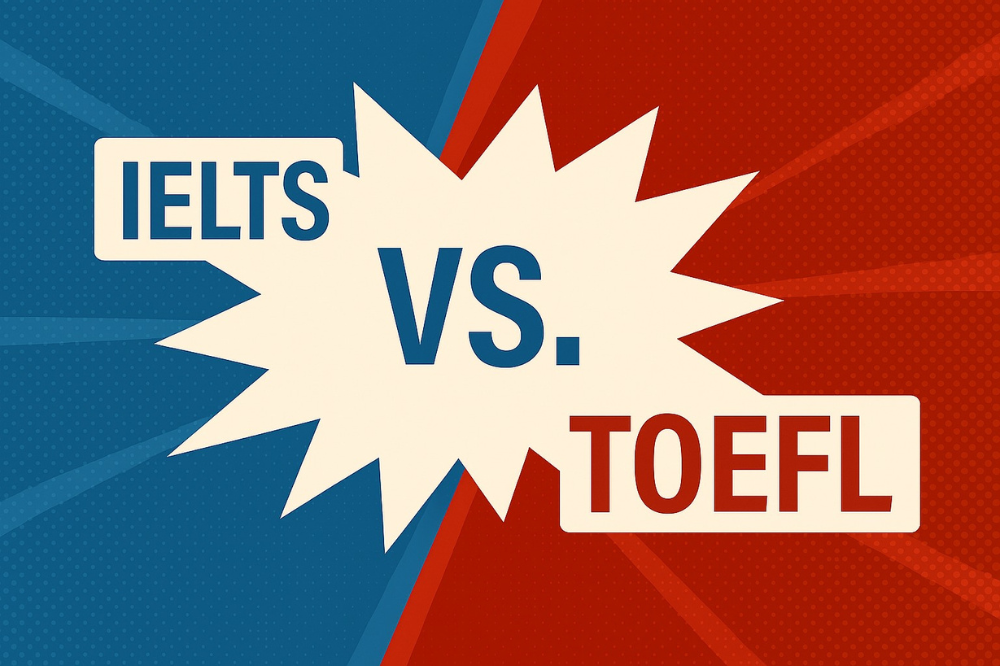Blog > IELTS vs TOEFL: Which Test Is Better?
IELTS vs TOEFL: Which Test Is Better?
June 11th, 2025

If you wish to study abroad, apply for a visa, or work in an English-speaking nation, you may need to present proof that you can communicate in English. Two English proficiency tests are hugely in demand and respected worldwide: IELTS (International English Language Testing System) and TOEFL (Test of English as a Foreign Language). They are generally accepted, but which is better? The answer is quite dependent on individual personalities, preferences, and requirements specific to the institution or country in consideration.
IELTS vs. TOEFL: An Overview
Let’s understand the tests quickly before going to compare:
IELTS: Developed by the British Council, IDP: IELTS Australia, and Cambridge Assessment English, Work accepted in the UK, Australia, Canada, and many other countries thus has two versions: IELTS Academic, for students applying to universities and IELTS General Training, for work, migration, or non-academic purposes.
TOEFL: Conducted by Educational Testing Service (ETS) in the US with preference for admission by many American and Canadian institutions. Primarily an Internet-based test (TOEFL iBT), but there is also a paper-based test offered in some locations.
Now, let us compare them with respect to various aspects:
1. Test Format
IELTS Format:
- Listening: 30 minutes (40 questions)
- Reading: 60 minutes (40 questions)
- Writing: 60 minutes (2 tasks)
- Speaking: 11-14 minutes (face-to-face with an examiner)
TOEFL Format:
- Reading: 35-56 minutes (30-40 questions)
- Listening: 36-51 minutes (28-39 questions)
- Speaking: 17 minutes (4 tasks, responses are recorded)
- Writing: 50 minutes (2 tasks)
Key Difference:
IELTS employs human examiners for the speaking test, whereas TOEFL responses are recorded for computerised evaluation. Thus, the IELTS tests a wider range of accents, and the TOEFL emphasises North American accents.
2. Speaking Test: Face-to-Face vs. Recorded Responses
Another obvious difference can be found in the speaking section.
IELTS: You have an interactive speech with an examiner. This may feel quite natural and comfortable—preferably for you—human interaction.
TOEFL: You'll speak into a microphone, and your responses will be recorded and graded by artificial intelligence or human graders. Some test-takers find this quite tough because it seems to be so unnatural and stressful.
What is better? If you feel very confident to converse in English with a good deal of casualness, then you might opt for IELTS. Or, maybe your preference is to have structured answers that can be typed into a computer; hence, TOEFL works for you.
3. Writing Section: Handwritten vs. Typing
In IELTS, you write your essays by hand.
In TOEFL, you simply type your answers on a computer.
TOEFL may be in your favour if you are a fast typist; otherwise, if you prefer writing with a pen, then IELTS will suit you best.
4. Scoring System
IELTS: Scores from 0 to 9 per section are given, and an overall band score averaging each section is computed.
TOEFL: Scores from 0 to 120 are awarded.
Is there a test that is said to be easier to score high? No simple answer. Some test-takers think IELTS grading is easier on writing and speaking, whereas others find TOEFL easier because of its structured format.
5. Acceptance and Recognition
IELTS: More widely used in the UK, Australia, New Zealand, and others; recognized in several universities in the U.S.
TOEFL: Accepted in the U.S. and Canada but is also worldwide.
Check with your institution or visa requirements before making a decision.
6. Availability and Cost
IELTS: It is held in more than 140 countries. Fees change from region to region, but usually, tests can be expected to range fees from $215–$250.
TOEFL: Available in 165 countries, with fees between $180 and $250.
Both tests are widely available, but the channels may differ depending upon your exact physical location.
Which Test is Good For You?
IELTS is the right choice for you if:
You are better at handwriting than typing
A personal interaction will make you feel more comfortable speaking than speaking into a microphone
You would like a bit of variety in accents—British, Australian, and so on
You wish to attend universities in the UK, Australia, or Canada
TOEFL might be the better choice if:
You prefer typing over handwriting
You are fine talking to a computer instead of a real person
You would be more comfortable with North American English
You wish to attend U.S. or Canadian universities
Conclusion: Which is Better?
In reality, there is no test that is better than the other. The one that suits you best depends on your proficiency, preferred mode of examination, and intended institution or country. Therefore, if you relish an interactive speaking test for the IELTS and writing on paper for the essay part, then IELTS is certainly for you. However, if you feel confident in taking computer-based exams where responses have to be structured in certain formats and typed out, then the TOEFL is for you.
Before making a choice, find out what your chosen university, employer, or immigration authority requires. It may also be a good idea to take practice tests for both exams so you can determine which one suits you better.






Add a Comment